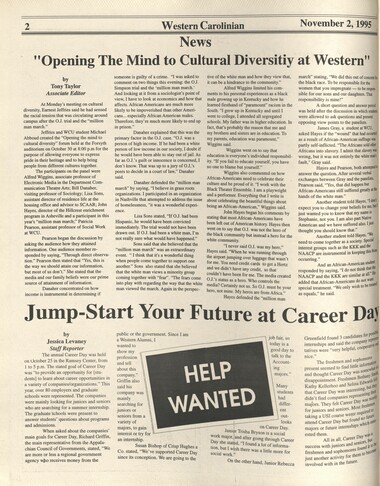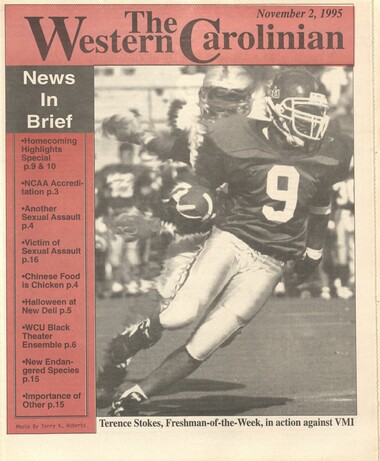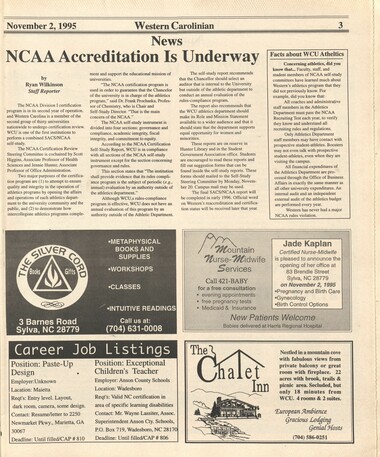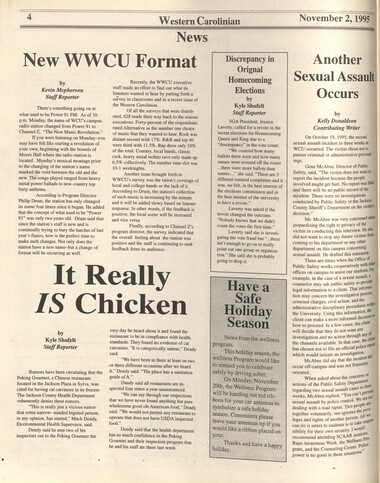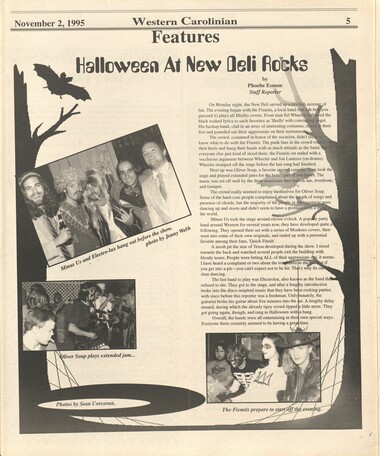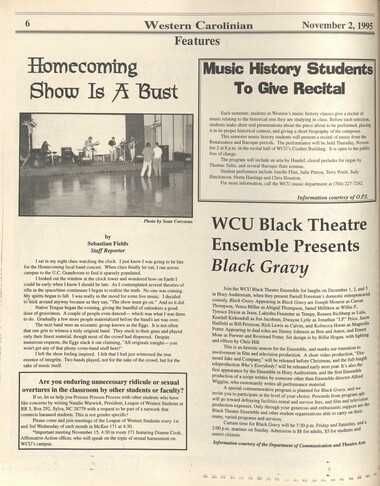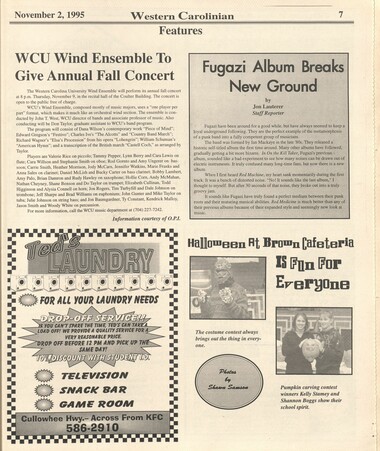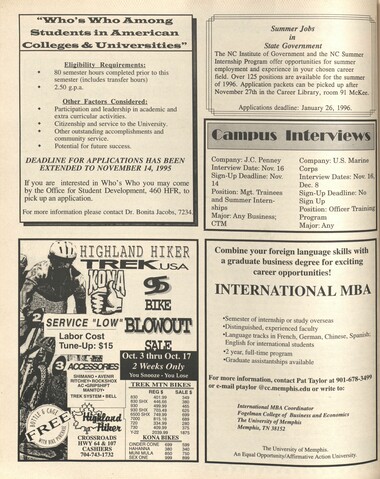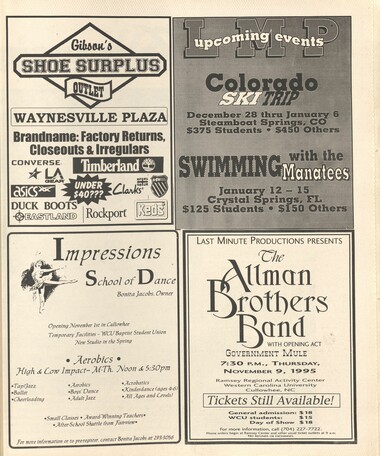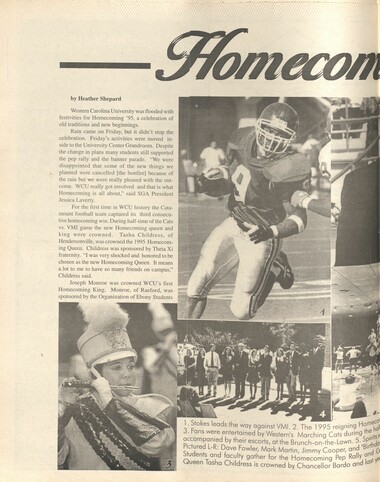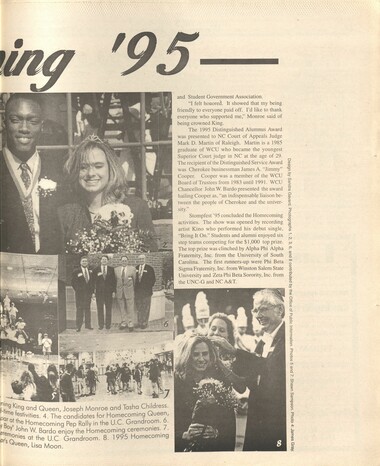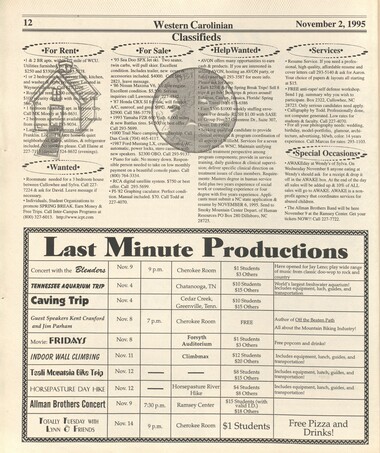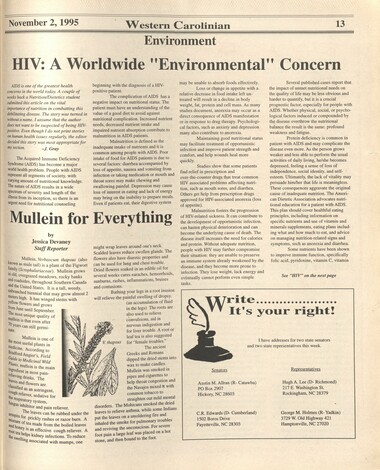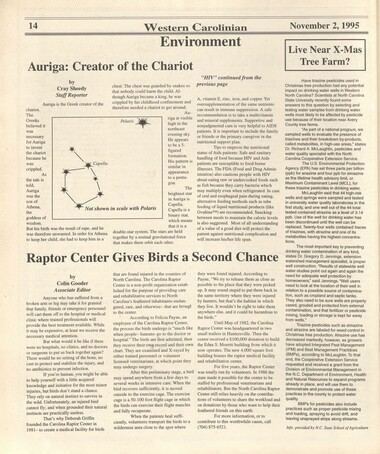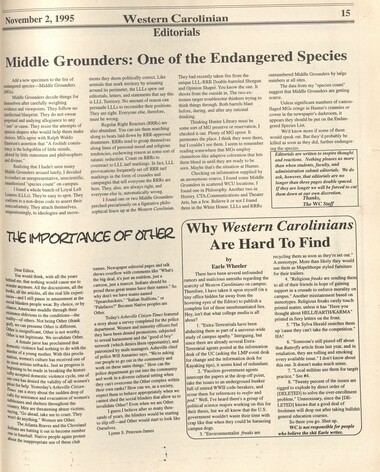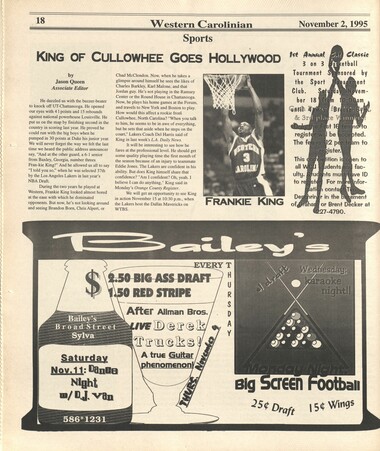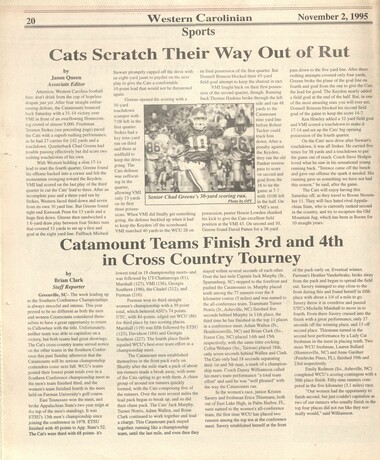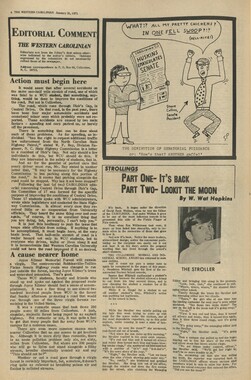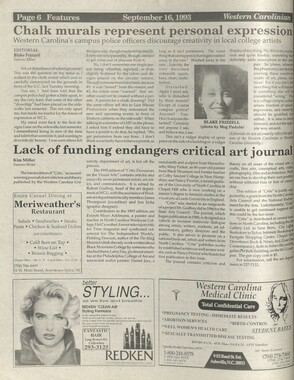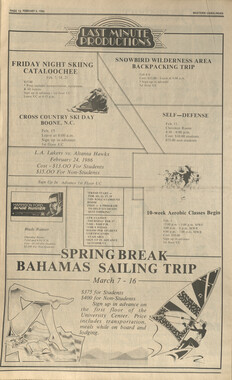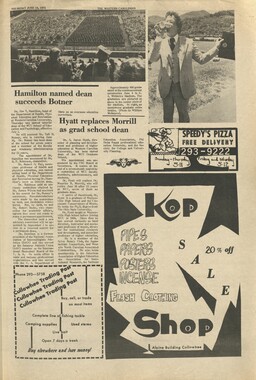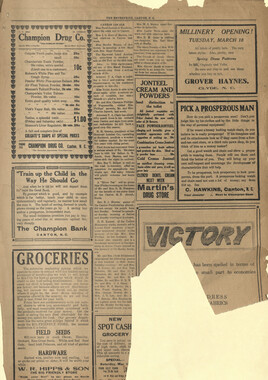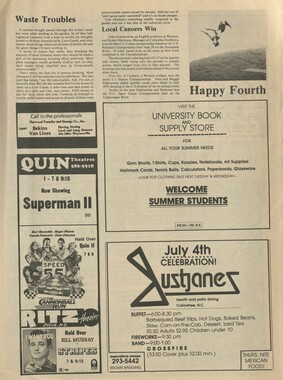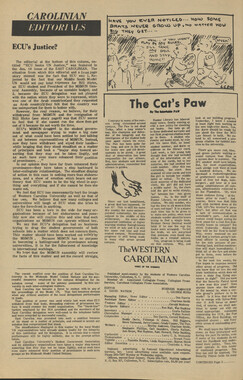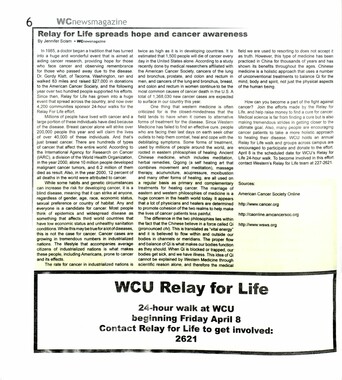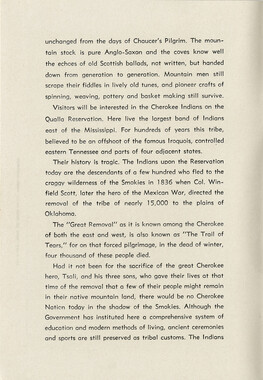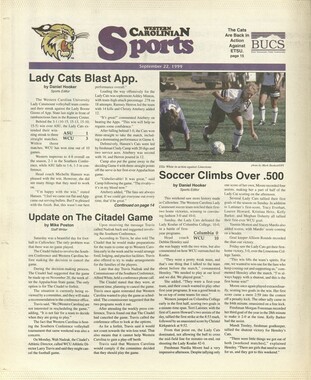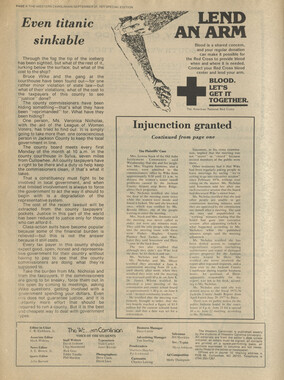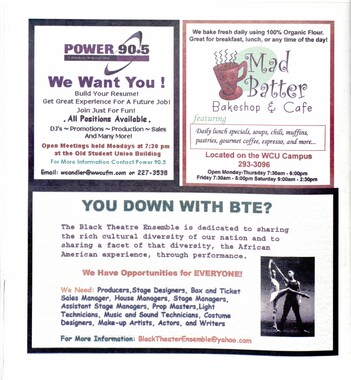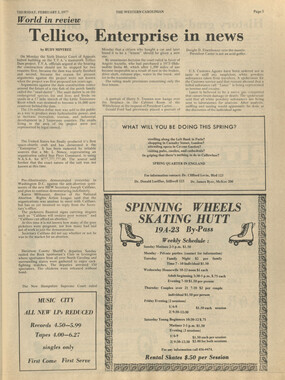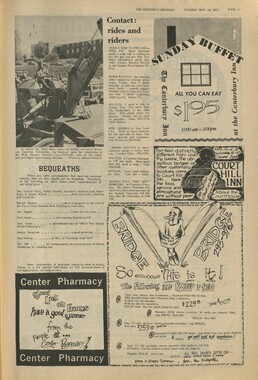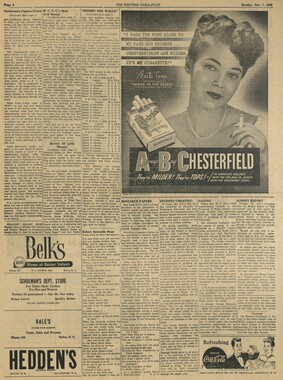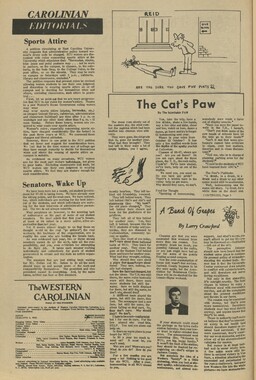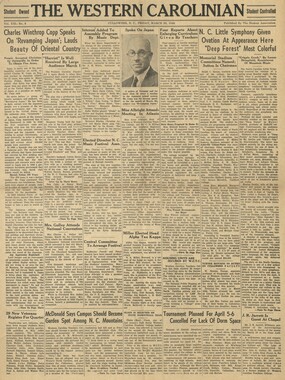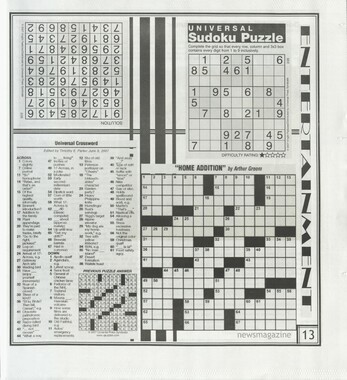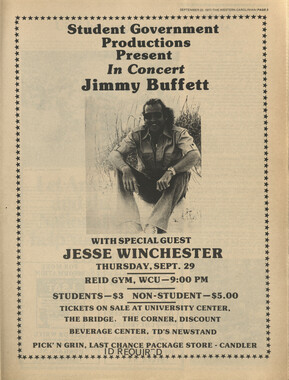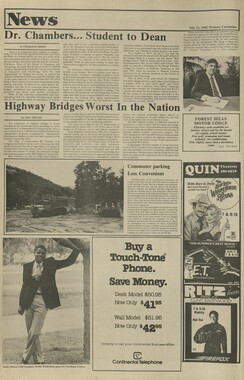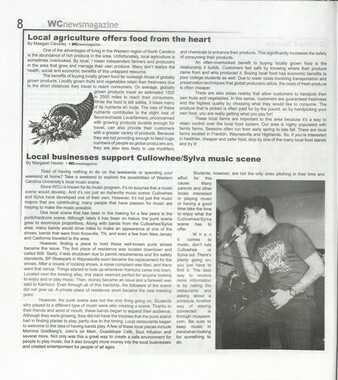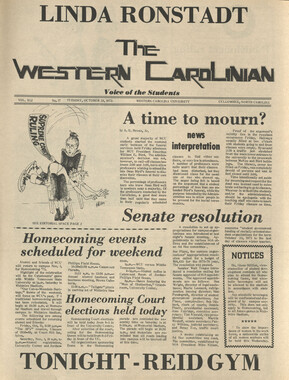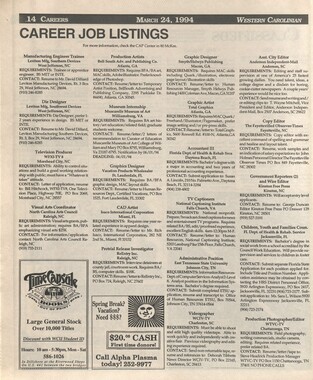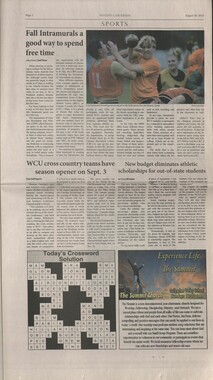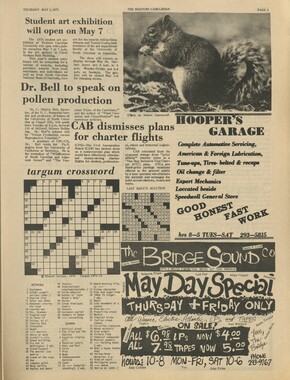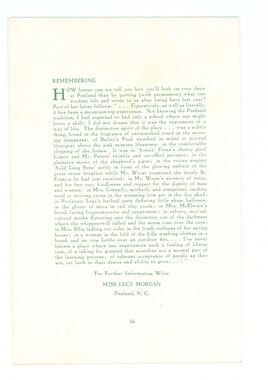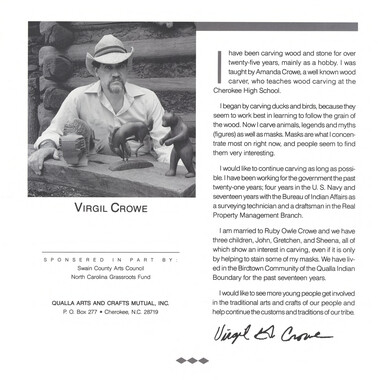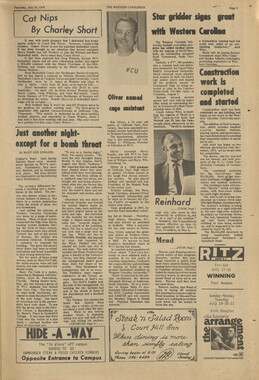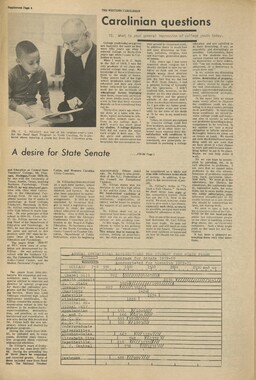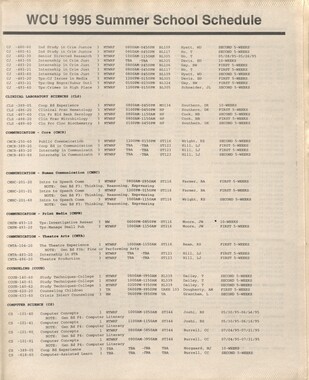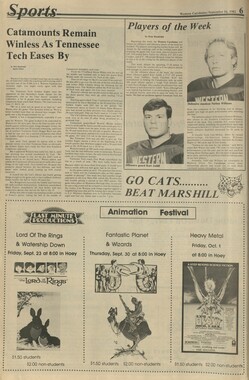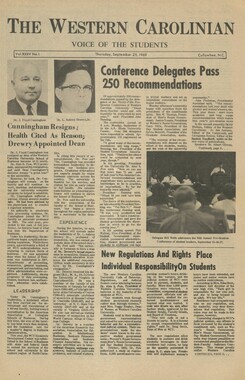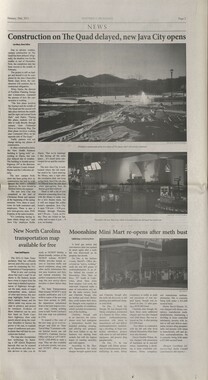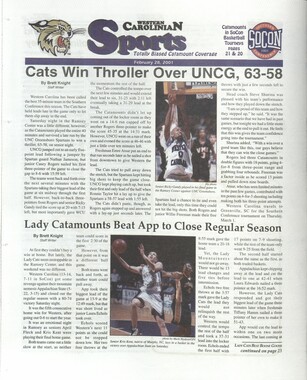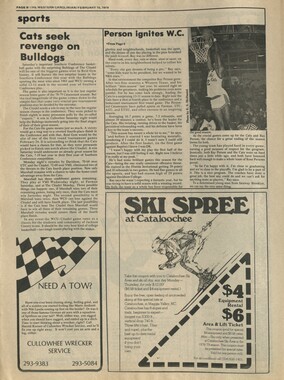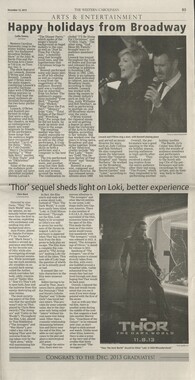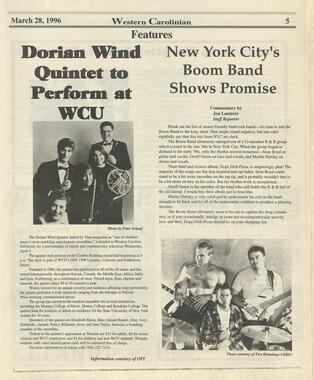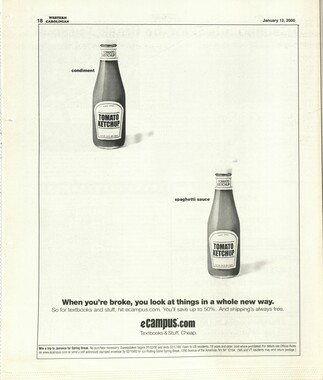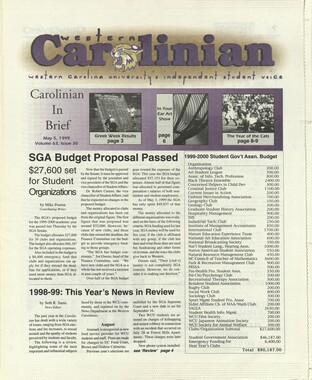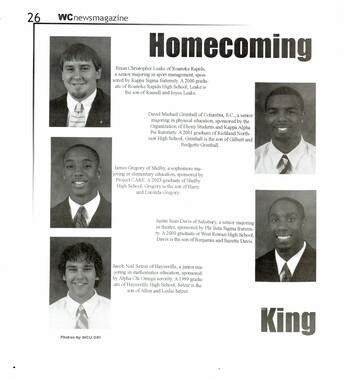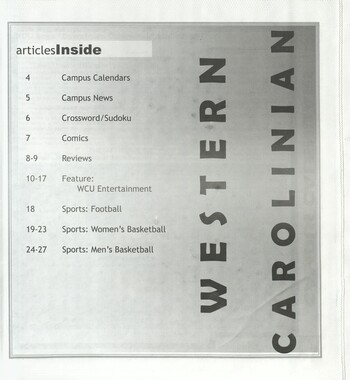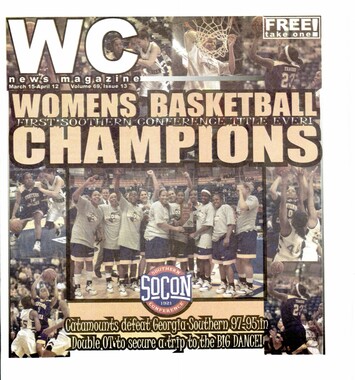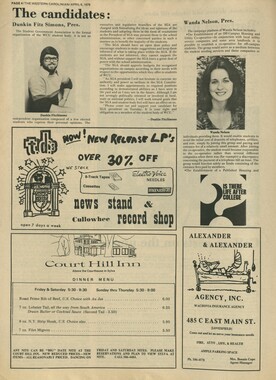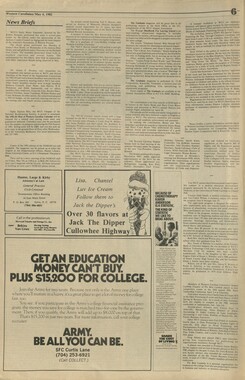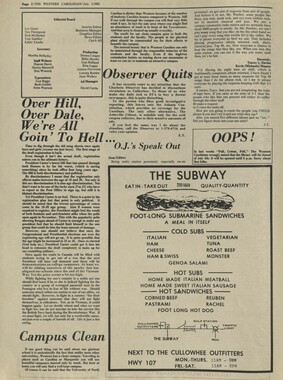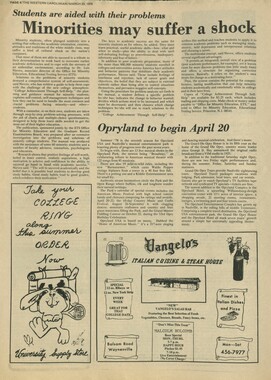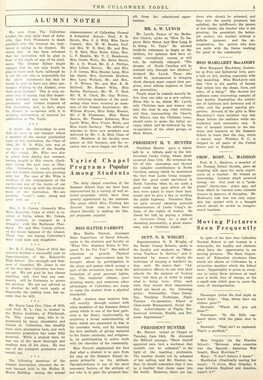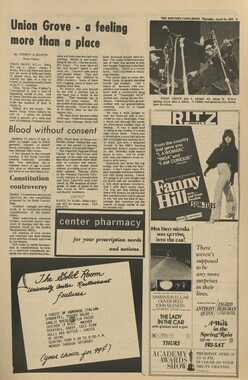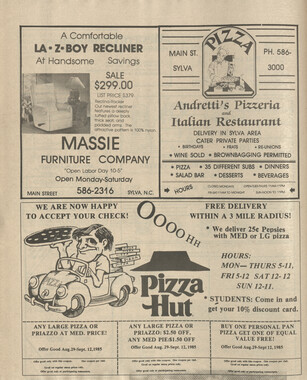Western Carolina University (21)
View all
- Canton Champion Fibre Company (2308)
- Cherokee Traditions (291)
- Civil War in Southern Appalachia (165)
- Craft Revival (1942)
- George Masa Collection (137)
- Great Smoky Mountains - A Park for America (3080)
- Highlights from Western Carolina University (422)
- Horace Kephart (973)
- Journeys Through Jackson (159)
- LGBTQIA+ Archive of Jackson County (89)
- Oral Histories of Western North Carolina (318)
- Picturing Appalachia (6617)
- Stories of Mountain Folk (413)
- Travel Western North Carolina (153)
- Western Carolina University Fine Art Museum Vitreograph Collection (129)
- Western Carolina University Herbarium (92)
- Western Carolina University: Making Memories (738)
- Western Carolina University Publications (2491)
- Western Carolina University Restricted Electronic Theses and Dissertations (146)
- Western North Carolina Regional Maps (71)
- World War II in Southern Appalachia (131)
University of North Carolina Asheville (6)
View all
- Allanstand Cottage Industries (62)
- Appalachian National Park Association (53)
- Bennett, Kelly, 1890-1974 (1463)
- Berry, Walter (76)
- Brasstown Carvers (40)
- Carver, George Washington, 1864?-1943 (26)
- Cathey, Joseph, 1803-1874 (1)
- Champion Fibre Company (233)
- Champion Paper and Fibre Company (297)
- Cherokee Indian Fair Association (16)
- Cherokee Language Program (22)
- Crowe, Amanda (40)
- Edmonston, Thomas Benton, 1842-1907 (7)
- Ensley, A. L. (Abraham Lincoln), 1865-1948 (275)
- Fromer, Irving Rhodes, 1913-1994 (70)
- George Butz (BFS 1907) (46)
- Goodrich, Frances Louisa (120)
- Grant, George Alexander, 1891-1964 (96)
- Heard, Marian Gladys (60)
- Kephart, Calvin, 1883-1969 (15)
- Kephart, Horace, 1862-1931 (313)
- Kephart, Laura, 1862-1954 (67)
- Laney, Gideon Thomas, 1889-1976 (439)
- Masa, George, 1881-1933 (61)
- McElhinney, William Julian, 1896-1953 (44)
- Niggli, Josephina, 1910-1983 (10)
- North Carolina Park Commission (105)
- Osborne, Kezia Stradley (9)
- Owens, Samuel Robert, 1918-1995 (11)
- Penland Weavers and Potters (36)
- Roberts, Vivienne (15)
- Roth, Albert, 1890-1974 (142)
- Schenck, Carl Alwin, 1868-1955 (1)
- Sherrill's Photography Studio (2565)
- Southern Highland Handicraft Guild (127)
- Southern Highlanders, Inc. (71)
- Stalcup, Jesse Bryson (46)
- Stearns, I. K. (213)
- Thompson, James Edward, 1880-1976 (226)
- United States. Indian Arts and Crafts Board (130)
- USFS (683)
- Vance, Zebulon Baird, 1830-1894 (1)
- Weaver, Zebulon, 1872-1948 (58)
- Western Carolina College (230)
- Western Carolina Teachers College (282)
- Western Carolina University (2008)
- Western Carolina University. Mountain Heritage Center (18)
- Whitman, Walt, 1819-1892 (10)
- Wilburn, Hiram Coleman, 1880-1967 (73)
- Williams, Isadora (3)
- Cain, Doreyl Ammons (0)
- Crittenden, Lorraine (0)
- Rhodes, Judy (0)
- Smith, Edward Clark (0)
- Appalachian Region, Southern (3032)
- Asheville (N.C.) (1945)
- Avery County (N.C.) (26)
- Blount County (Tenn.) (195)
- Buncombe County (N.C.) (1680)
- Cherokee County (N.C.) (283)
- Clay County (N.C.) (556)
- Graham County (N.C.) (238)
- Great Smoky Mountains National Park (N.C. and Tenn.) (525)
- Haywood County (N.C.) (3573)
- Henderson County (N.C.) (70)
- Jackson County (N.C.) (4925)
- Knox County (Tenn.) (35)
- Knoxville (Tenn.) (13)
- Lake Santeetlah (N.C.) (10)
- Macon County (N.C.) (421)
- Madison County (N.C.) (216)
- McDowell County (N.C.) (39)
- Mitchell County (N.C.) (135)
- Polk County (N.C.) (35)
- Qualla Boundary (982)
- Rutherford County (N.C.) (78)
- Swain County (N.C.) (2185)
- Transylvania County (N.C.) (270)
- Watauga County (N.C.) (12)
- Waynesville (N.C.) (86)
- Yancey County (N.C.) (72)
- Aerial Photographs (3)
- Aerial Views (60)
- Albums (books) (4)
- Articles (1)
- Artifacts (object Genre) (228)
- Bibliographies (1)
- Biography (general Genre) (2)
- Cards (information Artifacts) (38)
- Clippings (information Artifacts) (192)
- Copybooks (instructional Materials) (3)
- Crafts (art Genres) (622)
- Depictions (visual Works) (21)
- Design Drawings (1)
- Digital Moving Image Formats (2)
- Drawings (visual Works) (185)
- Envelopes (101)
- Exhibitions (events) (1)
- Facsimiles (reproductions) (1)
- Fiction (general Genre) (4)
- Financial Records (12)
- Fliers (printed Matter) (67)
- Glass Plate Negatives (381)
- Guidebooks (2)
- Internegatives (10)
- Interviews (823)
- Land Surveys (102)
- Letters (correspondence) (1045)
- Manuscripts (documents) (618)
- Maps (documents) (177)
- Memorandums (25)
- Minutes (administrative Records) (59)
- Negatives (photographs) (6090)
- Newsletters (1290)
- Newspapers (2)
- Notebooks (8)
- Occupation Currency (1)
- Paintings (visual Works) (1)
- Pen And Ink Drawings (1)
- Periodicals (194)
- Personal Narratives (10)
- Photographs (12977)
- Plans (maps) (1)
- Poetry (6)
- Portraits (4568)
- Postcards (329)
- Programs (documents) (181)
- Publications (documents) (2444)
- Questionnaires (65)
- Relief Prints (26)
- Sayings (literary Genre) (1)
- Scrapbooks (282)
- Sheet Music (2)
- Slides (photographs) (402)
- Songs (musical Compositions) (2)
- Sound Recordings (802)
- Specimens (92)
- Speeches (documents) (18)
- Tintypes (photographs) (8)
- Transcripts (329)
- Text Messages (0)
- A.L. Ensley Collection (275)
- Appalachian Industrial School Records (7)
- Appalachian National Park Association Records (336)
- Axley-Meroney Collection (2)
- Bayard Wootten Photograph Collection (20)
- Bethel Rural Community Organization Collection (7)
- Blumer Collection (5)
- C.W. Slagle Collection (20)
- Canton Area Historical Museum (2110)
- Carlos C. Campbell Collection (462)
- Cataloochee History Project (64)
- Cherokee Studies Collection (4)
- Daisy Dame Photograph Album (5)
- Daniel Boone VI Collection (1)
- Doris Ulmann Photograph Collection (112)
- Elizabeth H. Lasley Collection (1)
- Elizabeth Woolworth Szold Fleharty Collection (4)
- Frank Fry Collection (95)
- George Masa Collection (173)
- Gideon Laney Collection (452)
- Hazel Scarborough Collection (2)
- Hiram C. Wilburn Papers (28)
- Historic Photographs Collection (236)
- Horace Kephart Collection (861)
- Humbard Collection (33)
- Hunter and Weaver Families Collection (1)
- I. D. Blumenthal Collection (4)
- Isadora Williams Collection (4)
- Jesse Bryson Stalcup Collection (47)
- Jim Thompson Collection (224)
- John B. Battle Collection (7)
- John C. Campbell Folk School Records (80)
- John Parris Collection (6)
- Judaculla Rock project (2)
- Kelly Bennett Collection (1482)
- Love Family Papers (11)
- Major Wiley Parris Civil War Letters (3)
- Map Collection (12)
- McFee-Misemer Civil War Letters (34)
- Mountain Heritage Center Collection (4)
- Norburn - Robertson - Thomson Families Collection (44)
- Pauline Hood Collection (7)
- Pre-Guild Collection (2)
- Qualla Arts and Crafts Mutual Collection (12)
- R.A. Romanes Collection (681)
- Rosser H. Taylor Collection (1)
- Samuel Robert Owens Collection (94)
- Sara Madison Collection (144)
- Sherrill Studio Photo Collection (2558)
- Smoky Mountains Hiking Club Collection (616)
- Stories of Mountain Folk - Radio Programs (374)
- The Reporter, Western Carolina University (510)
- Venoy and Elizabeth Reed Collection (16)
- WCU Gender and Sexuality Oral History Project (36)
- WCU Mountain Heritage Center Oral Histories (25)
- WCU Oral History Collection - Mountain People, Mountain Lives (71)
- WCU Students Newspapers Collection (1923)
- Western North Carolina Tomorrow Black Oral History Project (69)
- William Williams Stringfield Collection (2)
- Zebulon Weaver Collection (109)
- African Americans (390)
- Appalachian Trail (35)
- Artisans (521)
- Cherokee art (84)
- Cherokee artists -- North Carolina (10)
- Cherokee language (21)
- Cherokee pottery (101)
- Cherokee women (208)
- Church buildings (190)
- Civilian Conservation Corps (U.S.) (111)
- College student newspapers and periodicals (2012)
- Dams (108)
- Dance (1023)
- Education (222)
- Floods (63)
- Folk music (1015)
- Forced removal, 1813-1903 (2)
- Forest conservation (220)
- Forests and forestry (1198)
- Gender nonconformity (4)
- Great Smoky Mountains National Park (N.C. and Tenn.) (181)
- Hunting (47)
- Landscape photography (25)
- Logging (122)
- Maps (83)
- Mines and mineral resources (9)
- North Carolina -- Maps (18)
- Paper industry (38)
- Postcards (255)
- Pottery (135)
- Railroad trains (72)
- Rural electrification -- North Carolina, Western (3)
- School integration -- Southern States (2)
- Segregation -- North Carolina, Western (5)
- Slavery (5)
- Sports (452)
- Storytelling (243)
- Waterfalls -- Great Smoky Mountains (N.C. and Tenn.) (66)
- Weaving -- Appalachian Region, Southern (280)
- Wood-carving -- Appalachian Region, Southern (328)
- World War, 1939-1945 (173)
Western Carolinian, November 2, 1995 (Volume 61 Number 10)
Item
Item’s are ‘child’ level descriptions to ‘parent’ objects, (e.g. one page of a whole book).
-
-
Western Carolinian November 2,1995 News "Opening The Mind to Cultural Diversitiy at Western" by Tony Taylor Associate Editor At Monday's meeting on cultural diversity, Earnest Jeffries said he had sensed the racial tension that was circulating around campus after the O.J. trial and the "million man march." Jeffries and WCU student Michael Abboud created the "Opening the mind to cultural diversity" forum held at the Forsyth auditorium on October 30 at 8:00 p.m for the purpose of allowing everyone to express pride in their heritage and to help bring people from different cultures together. The participants on the panel were Alfred Wiggins, associate professor of Electronic Media in the Department Communication Theatre Arts; Bill Danaher, visiting professor of Sociology; Lisa Sons, assistant director of residence life at the housing office and advisor to SCAAR; John Hayes, director of the Hillcrest enrichment program in Asheville and a participant in this year's "million man march;" Patricia Pearson, assistant professor of Social Work at WCU. Pearson began the discussion by asking the audience how they attained information. One audience member responded by saying, "Through direct observation." Pearson then stated that "Yes, this is the way we should attain our information, but most of us don't." She stated that the media and our family beliefs were our prime source of attainment of information. Danaher concentrated on how income is instrumental in determining if someone is guilty of a crime. "I was asked to comment on two things this evening: the O.J. Simpson trial and the 'million man march.' And looking at it from a sociologist's point of view, I have to look at economics and how that affects. African Americans are much more likely to be impoverished than other Americans... especially African American males. Therefore, they're much more likely to end up in prison." Danaher explained that this was the primary factor in the O.J. case. "O.J. was a person of high income. If he had been a white person of low income in our society, I doubt if he would have been able to stay out of jail. As far as O.J.'s guilt or innocence is concerned, I don't know. That was up to a jury of O.J.'s peers to decide in a court of law," Danaher said. Danaher defended the "million man march" by saying, "I believe in grass roots organizations. I participated in an organization in Nashville that attempted to address the issue of homelessness, "it was a wonderful experience. Lisa Sons stated, "If O.J. had been Hispanic, he would have been convicted immediately. The trial would not have been drawn out. If O.J. had been a white man, I'm not really sure what would have happened." Sons said that she believed that the "million man march" was an extraordinary event. " I think that it's a wonderful thing when people come together to support one another." Sons also stated that she believed that the white man views a minority group coming together with "fear". "The fears come into play with regarding the way that the white man viewed the march. Again in the perspec tive of the white man and how they view that, it can be a hindrance to the community." Alfred Wiggins limited his comments to his personal experiences as a black male growing up in Kentucky and how he learned firsthand of "paramount" racism in the South. "I grew up in Kentucky and until I went to college, I attended all segregated schools. My father was in higher education. In fact, that's probably the reason that me and my brothers and sisters are in education. To my parents, education was paramount," Wiggins said. Wiggins went on to say that education is everyone's individual responsibility. "If you fail to educate yourself, you have no one to blame but yourself." Wiggins also commented on how African-Americans need to celebrate their culture and be proud of it. "I work with the Black Theater Ensemble. I am a playwright and a performer. Everything that I write is about celebrating the beautiful things about being an African-American," Wiggins said. John Hayes began his comments by stating that most African-Americans have been left out of American history. Hayes then went on to say that O.J. was not the hero of the black community but instead a hero for the white community. "I never said O.J. was my hero," Hayes said. "When he was running through the airport jumping over luggage that wasn't for me. You need credit cards to get a Hertz and we didn't have any credit, so that couldn't have been for me. The media created OJ.'s status as a hero. Who controls the media? Certainly not us. So O.J. must be your hero, not mine. My heros are from Africa." Hayes defended the "million man march" stating, "We did this out of concemfoi the black race. To be responsible for the women that you impregnate — to be responsible for our sons and our daughters. That responsibility is mine!" A short question and answer period was held after the discussion in which students were allowed to ask questions and present opposing view points to the panelists. James Gray, a student at WCU, asked Hayes if the "wound" that had occurred as a result of African-American suffrage was partly self-inflicted. "The Africans sold other Africans into slavery. I admit that slavery was wrong, but it was not entirely the white man's fault," Gray said. Hayes and Pearson, both attemptedto answer the question. After several verbal exchanges between Gray and the panelists, Pearson said, "Yes, that did happen but African-Americans still suffered greatly at the hands of the white man." Another student told Hayes, "I don't expect you to change your beliefs for me, but! just wanted you to know that my name is Stephanie, not you. I am also part Native American and we have suffered also. I just thought you should know that." Another student told Hayes, "We need to come together as a society. Special interest groups such as the KKK and the NAACP are instrumental in keeping this from occurring." And an African-American student responded by saying, "I do not think that the NAACP and the KKK are similar at all H added that African-Americans do not wan special treatment. "We only wish to be tre as equals," he said. Jump-Start Your Future at Career DaJ by Jessica Levaney StaffReporter The annual Career Day was held on October 25 in the Ramsey Center, from 1 to 5 p.m. The stated goal of Career Day was "to provide an opportunity for [students] to learn about career opportunities in a variety of companies/organizations." This year, over 80 employers and graduate schools were represented. The companies were mainly looking for juniors and seniors who are searching for a summer internship. The graduate schools were present to answer students' questions about programs and admissions. When asked about the companies' main goals for Career Day, Richard Griffin, the main representative from the Appalachian Council of Governments, stated, "We are more or less a regional government agency wjio receives money from the public or the government. Since I am a Western Alumni, I wanted to show my , profession ' and tell about this company." V Griffin also \ said his company was mainly searching for juniors or ii seniors from a '• variety of majors, to gain interest or try for \ an internship. Susan Bishop of Crisp Hughes a Co. stated, "We've supported Career Day since its conception. We are going to the job fair, so today is a good day to talk to the Accounting majors." Many students had different outlooks on Career Day WorknJUm<?r7:,ShaBrySOniSas0c^ ^Sft^gomg through Career On the other hand, Junior Rebecca \NANtt° 'fja Greenfield found 3 candidates for po^ internships and said the company i-^ tatives were "very helpful, cooped " The freshmen and sophomor^ present seemed to find little in {l and thought Career Day was som ^ disappointment. Freshmen »«" ^ftf Kathy Kcllcrhoo and Selma fc ^ that Career Day was interesting.^^ ^^ didn't find companies represe ^ ma/ors. They felt CareerDay for juniors and seniors. Mos ^ taking a USI course werer rcq ^ attend Career Day but found .0. majors or future internships estedthem. n»vwasa All in all. Career W success with juniors and seWj.((0 p freshmen and sophomores ^ just another activity for them involved with in the future.
Object
Object’s are ‘parent’ level descriptions to ‘children’ items, (e.g. a book with pages).
-
The Western Carolinian is Western Carolina University's student-run newspaper. The paper was published as the Cullowhee Yodel from 1924 to 1931 before changing its name to The Western Carolinian in 1933.
-
